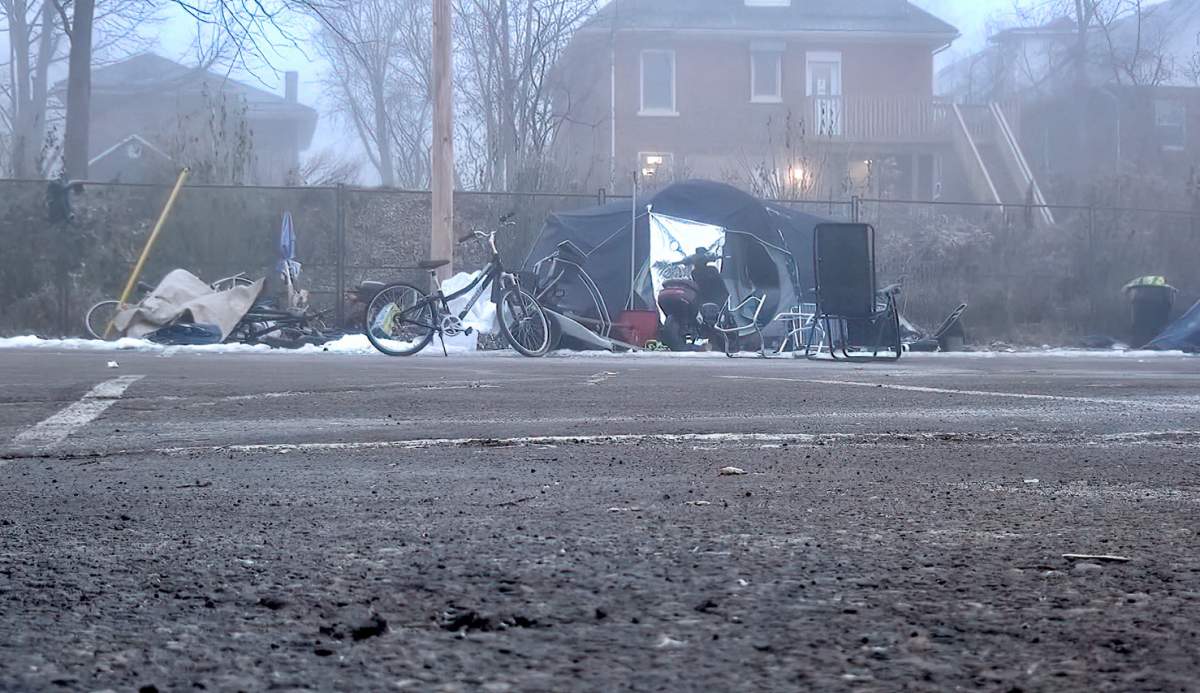A city staff report recommends implementing temporary modular housing on city-owned property on Wolfe Street as a short-term way to help the homeless population in Peterborough, Ont.

City council on Monday will review the extensive report, which suggests modular units be placed at 210 Wolfe St./Rehill parking lot for those who are experiencing homelessness. For a number of months, the area has had an encampment.
The report says the city-owned Wolfe Street property is the ideal location since it’s readily available to implement units before the winter and provides “flexibility” to ensure the success of the modular units. A building on the site currently has bathrooms, shower access and meals, and security services could be provided, which would alleviate “some pressures on the neighbourhood.”
“This property is large enough to ensure that sufficient numbers of modular units can be placed on the site as well as the appropriate services needed for all individuals,” the states the report submitted by Sheldon Laidman, commissioner of Community Services.
“It is close to downtown, where the majority of the supports and services that clients access are located. There are concerns that any locations outside of the downtown core will not be utilized by individuals who need or prefer to be able to easily access services downtown.”
The report says locations outside of the downtown will only continue to encourage people to attempt to tent in downtown-area parks.
Coun. Alex Bierk, a longtime advocate for the homeless community, says the report represents a “significant shift” in the way the city is addressing the shared crisis. Council will vote on endorsing the proposal during Monday’s meeting.
“The report outlines impactful steps that prioritize the needs of our most vulnerable community members and starts to address the failures in current systems of support,” he said.
The report notes staff would work with a number of community organizations and agencies to “ensure the success of this operation and its layout” for the community hub setup.

Get daily National news
“As a hub, there would be the opportunity to immediately connect individuals to the supports that they need,” the report states. “By providing modular units, clients who are currently unsheltered would be safer and be supported towards stabilization, and ultimately permanent housing. Fencing would be provided to enhance privacy for people using the temporary housing and for neighbours in the Wolfe Street area.”
The city notes the modular units are different than the housing focus spearheaded by the Peterborough Action for Tiny Homes (PATH).
“The City is working with that community group to support the addition of sleeping cabins,” stated Brendan Wedley, the city’s communication services manager on behalf of Jocelyn Brazelyn, homelessness and data program manager who was unavailable Thursday for comment.
“The city will continue to work with PATH on that initiative. The proposal for modular temporary housing is a separate approach that would add more alternative options.”
Numbers
The number of modular units to be added and the type (multiple options available) and budget for the proposal were not referenced. The city says further details would be forthcoming if the proposal is approved by council.
However, the report notes that as of April 15, there were 302 individuals on the city’s by-name priority list (BNPL), a real-time list of all people experiencing homelessness in the city. The list encompasses those staying in shelters, outside or in precarious housing scenarios.
More than half on the list (161) are chronically experiencing homelessness, which means homeless for at least six months within the last year (and not necessarily consecutive months). It’s estimated between 53 and 70 individuals are currently unsheltered, the report states.
Age-wise, 42 individuals are between 16 and 24, and 16 were identified as seniors over age 64. Sixty-one individuals identify as Indigenous.
The city currently offers 106 emergency shelter beds at three permanent sites and an overflow shelter (74 shelter beds operating 24-7 and 32 beds available for 12 hours a night).
Between Jan. 1 and March 31, there were 295 unique individuals who accessed the shelter system at one point, the report notes.

The report says the city can use the additional $2.5 million unbudgeted increase announced in March via the province’s Homelessness Prevention Program. The city’s 2023 approved budget has $6.934 million for its homeless program, which included $5.164 million from the province, $1.203 million from the city, $208,000 from Peterborough County and $359,000 from city reserves.
No timeframe has been provided for how long the modular units would be at the Wolfe Street site. The ultimate goal is to move individuals into existing supportive housing programs or resolve their homelessness experience.
“It is expected that reorienting supports from the overflow shelter to these modular units along with better security, site improvements, and on-site storage may lessen the impact on the neighbourhood,” the report states.







Comments
Want to discuss? Please read our Commenting Policy first.